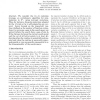Free Online Productivity Tools
i2Speak
i2Symbol
i2OCR
iTex2Img
iWeb2Print
iWeb2Shot
i2Type
iPdf2Split
iPdf2Merge
i2Bopomofo
i2Arabic
i2Style
i2Image
i2PDF
iLatex2Rtf
Sci2ools
CEC
2005
IEEE
2005
IEEE
On the complexity of overcoming gaps with isotropic mutations and elitist selection
We consider the (1+λ) evolution strategy, an evolutionary algorithm for minimization in Rn , using isotropic mutations. Thus, for instance, Gaussian mutations adapted by the 1/5-rule or by σ-self-adaptation are covered. Lower bounds on the (expected) runtime (defined as the number of function evaluations) to overcome a gap in the search space are proved (where the search faces a gap of size ∆ if the distance between the current search point and the set of all better points is at least ∆), showing when the runtime is potentially polynomial and when the runtime is necessarily superpolynomial or even necessarily exponential in n, the dimensionality of the search space.
| Added | 24 Jun 2010 |
| Updated | 24 Jun 2010 |
| Type | Conference |
| Year | 2005 |
| Where | CEC |
| Authors | Jens Jägersküpper |
Comments (0)

